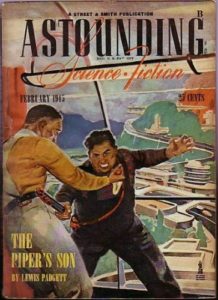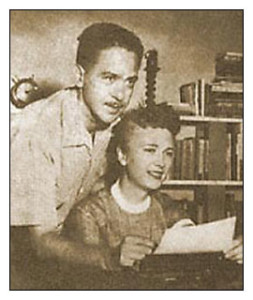 “The Piper’s Son”
“The Piper’s Son”
Originally published in Astounding Science Fiction, Feb. 1945
Henry Kuttner wrote a series of stories in collaboration with his wife C. L. Moore about a race of telepathic mutants called Baldies. This series consisted of five novelettes and ran under the Lewis Padgett byline in Astounding Science Fiction in the 1940s. This post will look at the first of them. I’ll look at the rest every Friday and Tuesday until I’ve covered the entire series and the fix-up novel containing them all.
First a bit of backstory. The setting is about one generation, maybe two, after a nuclear war. Chicago, among other cities, was destroyed. There are strict limits on how large a municipality can grow. Any town that gets too large is destroyed.
The radiation blast created a number of mutants. Among them are a race of hairless telepaths known as Baldies. They wear wigs and do their best to blend into society. Understandably, they’re feared and hated by a large segment of the population.
This particular story concerns Ed Burkhalter. Ed is a Baldy who works for a publishing company. It’s his job in this story to help a particular writer overcome some blocks so his book can be published on schedule. These scenes tend to show a lot about what it’s like to be a telepath this world. Ed spends much of the scenes in which he interacts with the author trying to convince that man that Baldies aren’t a threat and why that’s the case.
The mutation that created the Baldies is one that’s pretty unstable. Many of the Baldies are insane. They’re usually the easiest to spot and are quickly dealt with. Others are paranoid. They aren’t so obvious. And can present a great danger.
Because of their abilities to read minds, the Baldies aren’t well liked. There are certain things they can’t do, either by law or by social convention. One such thing is dueling. Duels are legal and frequently used to settle disputes. When a belligerent man accuses believes that Ed’s wife has eavesdropped telepathically on his wife and spread secrets about her, he challenges Ed to a duel. Ed goes to his house to try to convince the man that his wife hasn’t read the other woman’s mind and doesn’t know her.
Of course it isn’t that easy. Unable to convince him otherwise, Ed ends up fighting the man, but with his dagger sheathed, just to prove to the guy that a duel isn’t such a good idea.
Interspersed throughout the story is a plotline concerning Ed’s son, who is in elementary school. All of the Baldy children are sharing in an adventure about a Green Man. It’s sort of a science-fantasy story they share, kind of a telepathic role playing game.
Only it’s not a game. There’s a Baldy controlling the storyline, which is an allegory about how Baldies are superior to ordinary humans and should subjugate them. Ed and his friends have to deal with the guy behind it. He’s a threat to the Baldy race, because he is training these children to hate and ultimately rise up against normal humans. The Baldies are few in number compared to the rest of the population. If real, physical persecution were to arise against them, they could be wiped out. Ed and his friends have to do something. In Baldy philosophy, the good of the race comes before the good of the individual.
This isn’t the most action packed story. Kuttner and Moore certainly wrote others higher on the excitement scale, both individually and collaboratively. The trademark whacky humor Kuttner was often noted for is missing, as is the poetic wordsmithing Moore excelled at. The dark streak that sometimes appeared in their work is there but not as strong. It’s more of a thoughtful examination of what would happen if a telepathic mutation were to arise, the sort of thing Astounding editor John W. Campbell liked to include in his magazine. There’s a bit more philosophizing than I’m used to in a Kuttner story. Which may explain why I’ve only read this one twice before, and the others in this series only once. More on that in the final post of this series..
Am I saying “The Piper’s Son” isn’t worth reading? Not at all. It’s a rewarding tale, no question, and Kuttner and Moore give us lots to think about. The future they present is an interesting one, although I find it to be a bit too tame for my view of human nature. By that I mean I don’t think a race of telepaths would be as accepted as they are, much less as noble minded.
At its heart, “The Piper’s Son” is sociological sf, not adventure. That’s not a bad thing, but it wasn’t what Kuttner and Moore were best at.

